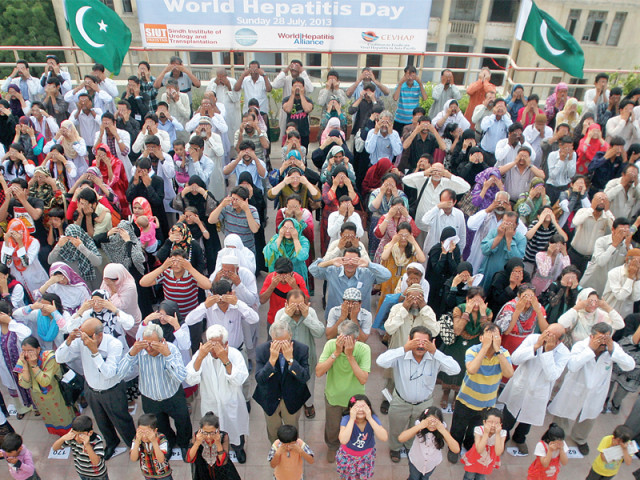World Hepatitis Day 2013: Sindh takes part in attempt to set global world record
Medical professionals, students and others take part in the event hosted by SIUT.

Participants, act out the proverbial “see no evil, hear no evil, speak no evil” principles on Sunday. Each participant was giving a number and asked to stand at their respective spot marked on the roof of the SIUT building. PHOTO: ATHAR KHAN/EXPRESS
A long time ago, three wise monkeys told the world that turning a blind eye to a problem does not mean that it will go away. With this advice in mind, people across the world on Sunday, on the call of the World Hepatitis Alliance, conveyed the message that if we don’t deal with hepatitis head on, then it will only keep growing and ruining lives.
Sindh was among those who participated in the attempt to set a Guinness World Record by having the most people perform the “see no evil, hear no evil, speak no evil” actions in 24 hours in celebration of the World Hepatitis Day 2013 - over 200 men, women and children performed the actions on the roof of the Sindh Institute of Urology and Transplantation (SIUT).

The participants were given numbers and asked to stand at their respective spot marked on the roof of the SIUT building. Former judge of the Supreme Court of Pakistan, Justice (retd) Rana Bhagwandas, Faisal Edhi of the Edhi Foundation and SIUT Director Prof. Dr Adib Rizvi were among those who participated.
The institute’s media coordinator said that the theme conveyed the message that hepatitis was being ignored around the world.
“The theme, See no evil, hear no evil, speak no evil, of the 6th World Hepatitis Day refers to those people who deal with this problem by not acknowledging it,” Dr Farina Hanif told The Express Tribune.
Doing good by creating awareness
Maheen Sami, a student who participated in the act, told The Express Tribune that they wanted to create awareness among the masses that hepatitis is a malicious disease. “We want to tell the people they should not ignore hepatitis and take proper treatment to keep away from hepatitis B and C,” said Sami. “People should know that they cannot protect themselves by simply ignoring this disease or by turning their back to it.”

Mohammad Subhan, who recently recovered from hepatitis C, was also a participant at the event on Sunday. “Hepatitis is no doubt a dangerous disease but if people go through proper treatment and take good care of themselves, they can easily recover.”
At the seminar held earlier, speakers urged the government to allocate more funds for health and education than other departments. Prof. Adib Rizvi said that in Pakistan, the prevalence of hepatitis C was around 4.8 per cent and hepatitis B around 2.5 per cent. “If we are to prevent millions of new infections and the shocking death toll of hepatitis, then a comprehensive effort by the government is urgently required.”
Dr Saeed Hamid from the Department of Medicine at Aga Khan University in his presentation said, “Hepatitis kills a person every 30 seconds in the Asia Pacific region but we don’t take it as seriously as we take Aids.” He described the risk factors involved in the transfer of hepatitis, adding that in the year 2000, there were only 23 blood banks in Karachi who had the facility to test hepatitis C correctly. Even now we have the same number of blood banks, he said. “If we control the usage of used syringes, then we can control 1,575,000 hepatitis C infections and 300,000 hepatitis B infections,” said Hamid.
Justice (retd) Rana Bhagwandas in his speech stressed the need for creating awareness among the people and appealed to the doctors to spread information regarding hepatitis in their areas of work. “The government should allocate more funds for health and education and should also remove corruption from the country so that everyone has enough facilities of treatment.” He expressed his grief over the rapid spread of hepatitis in Pakistan, Africa and Asia Pacific region and asked for serious efforts to stop this disease.
Published in The Express Tribune, July 29th, 2013.



















COMMENTS
Comments are moderated and generally will be posted if they are on-topic and not abusive.
For more information, please see our Comments FAQ